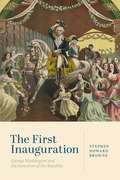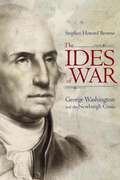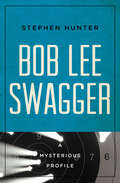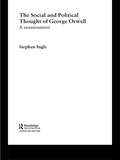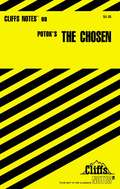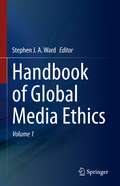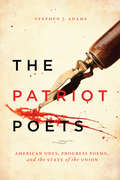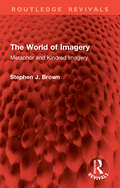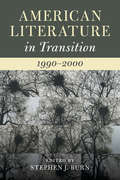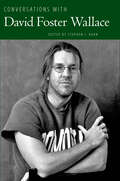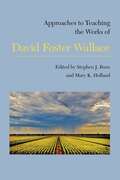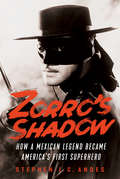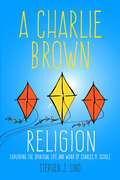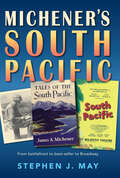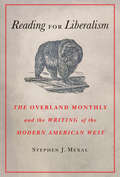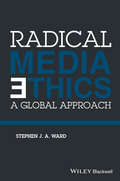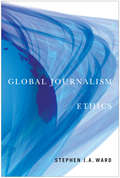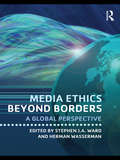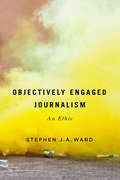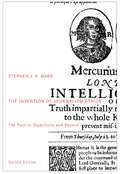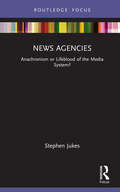- Table View
- List View
The First Inauguration: George Washington and the Invention of the Republic
by Stephen Howard Browne"Among the vicissitudes incident to life, no event could have filled me with greater anxieties than that of which the notification was transmitted by your order, and received on the fourteenth day of the present month." With these words to the assembled members of the Senate and House of Representatives on April 30, 1789, George Washington inaugurated the American experiment. It was a momentous occasion and an immensely important moment for the nation. Never before had a people dared to invent a system of government quite like the one that Washington was preparing to lead, and the tensions between hope and skepticism ran high.In this book, distinguished scholar of early America Stephen Howard Browne chronicles the efforts of the first president of the United States of America to unite the nation through ceremony, celebrations, and oratory. The story follows Washington on his journey from Mount Vernon to the site of the inauguration in Manhattan, recounting the festivities—speeches, parades, dances, music, food, and flag-waving—that greeted the president-elect along the way. Considering the persuasive power of this procession, Browne captures in detail the pageantry, anxiety, and spirit of the nation to arrive at a more nuanced and richly textured perspective on what it took to launch the modern republican state. Compellingly written and artfully argued, The First Inauguration tells the story of the early republic—and of a president who, by his words and comportment, provides a model of leadership and democratic governance for today.
The First Inauguration: George Washington and the Invention of the Republic
by Stephen Howard Browne“Among the vicissitudes incident to life, no event could have filled me with greater anxieties than that of which the notification was transmitted by your order, and received on the fourteenth day of the present month.”With these words to the assembled members of the Senate and House of Representatives on April 30, 1789, George Washington inaugurated the American experiment. It was a momentous occasion and an immensely important moment for the nation. Never before had a people dared to invent a system of government quite like the one that Washington was preparing to lead, and the tensions between hope and skepticism ran high.In this book, distinguished scholar of early America Stephen Howard Browne chronicles the efforts of the first president of the United States of America to unite the nation through ceremony, celebrations, and oratory. The story follows Washington on his journey from Mount Vernon to the site of the inauguration in Manhattan, recounting the festivities—speeches, parades, dances, music, food, and flag-waving—that greeted the president-elect along the way. Considering the persuasive power of this procession, Browne captures in detail the pageantry, anxiety, and spirit of the nation to arrive at a more nuanced and richly textured perspective on what it took to launch the modern republican state. Compellingly written and artfully argued, The First Inauguration tells the story of the early republic—and of a president who, by his words and comportment, provides a model of leadership and democratic governance for today.
The Ides of War: George Washington and the Newburgh Crisis (Studies in Rhetoric & Communication)
by Stephen Howard BrowneA history and analysis of how George Washington stopped an attempted military coup at the end of the American Revolutionary War.History tells us that on a day when the forces of civil government confront the forces of military might, no one knows what may follow. Americans believe that they have avoided this moment, that whatever other challenges the country has faced, at least it never has had to deal with the prospects of a coup d’état. Stephen Howard Browne maintains that this view is mistaken, that in fact the United States faced such a crisis, at the very moment when the country announced its arrival on the world scene in the spring of 1783 in a rustic meeting hall along the Hudson River near Newburgh, New York. The crisis was resolved by George Washington, commander in chief of the US Army, in an address he delivered to a roomful of restive and deeply disaffected officers.In The Ides of War, Browne examines the resolution of the first confrontation between the forces of American civil government and the American military—the Newburgh Crisis. He tells the story of what transpired on that day, examines what was said, and suggests what we might learn from the affair. Browne shows that George Washington’s Newburgh Address is a stunning example of the power of human agency to broker one of our most persistent, most troublesome dilemmas: the rival claims to power of civil and military authorities. At stake in this story are biding questions about the meaning and legacy of revolution, the nature of republican government, and ultimately what kind of people we are and profess to be.Browne holds that although these are monolithic and vexed themes, they are vital and need to be confronted to obtain a coherent and convincing account of history. The Newburgh Crisis offers an unmatched opportunity to examine these themes, as well as the role of rhetoric in the founding of the world’s first modern republic.“Few speeches have shaped the course of American history more than George Washington’s address to his potentially mutinous officers in Newburgh, New York, on March 15, 1783. In this splendid book, Browne deftly brings to life the Newburgh conspiracy, Washington’s masterful response to it, and the lasting implications of both for civil-military relations in a republican government.” —Stephen Lucas, Evjue-Bascom Professor in the Humanities, University of Wisconsin“This elegant and persuasive book expands our knowledge of a little known but hugely significant turning point in American history, one that set it on course toward liberty and democracy. In the process, Browne brings new understanding to the founding of the United States, its military system, and its first commander in chief.” —Richard H. Kohn, professor emeritus of history and peace, war, and defense, University of North Carolina at Chapel Hill
Bob Lee Swagger: A Mysterious Profile (Mysterious Profiles #6)
by Stephen HunterThe Pulitzer Prize–winning, New York Times–bestselling author describes how he created his popular veteran sniper.Retired Marine Gunnery Sgt. Bob Lee Swagger debuted in Stephen Hunter’s military action thriller Point of Impact in 1993. The book was the first of many adventures for the fictional sniper and inspired a hit-movie, as well as a television series. But what led to the invention of such a character?In this quick read, Hunter shares how “the Nailer” came to his kitchen table and subsequently sprang to life. Hunter discusses the real-life hero who served as his inspiration for Swagger, the development of his first villains, and the influence the television show Dragnet had on his writing. He also details how research helped shaped Swagger’s world, and explains what keeps him writing adventure after adventure.Praise for the Bob Lee Swagger Novels“Nobody writes action better than Stephen Hunter and Black Light is one of his best. . . . [The] action scenes play like a movie, the plot is intriguing and the writing is top-notch.” —Phillip Margolin, author of The Burning Man“Stephen Hunter is in a class by himself. Time to Hunt is as vivid and haunting as a moving target in the crosshairs of a sniper scope.” —Nelson Demille, author of Mayday“The best straight-up thriller writer at work today.” —Rocky Mountain News“Thrilling in the manner of ancient storytellers, with battles fierce enough for a war and characters crazy enough to fight them to the death.” —New York Times Book Review“A thinking man’s Rambo.” —Publishers Weekly
The Social and Political Thought of George Orwell: A Reassessment (Routledge Studies in Social and Political Thought #Vol. 45)
by Stephen IngleStephen Ingle is Professor at the Politics Department, University of Stirling. His main academic interests are in the relationship between politics and literature and in adversarial (two party) politics, especially in the UK.
CliffsNotes on Potok's The Chosen
by Stephen J GreensteinThe original CliffsNotes study guides offer expert commentary on major themes, plots, characters, literary devices, and historical background.CliffsNotes on The Chosen reveals the condition of American Jews living in two cultures, one secular and one religious. In his classic novel, author Chaim Potok is describing not only the lives of the characters but his own life, as well.With this study guide, you'll be able to walk a mile in the shoes of a Jewish American of the 1940s. You'll also gain insight into the life of Potok and historical influences on this novel. Other features that help you study includeCharacter analyses of major playersA character map that graphically illustrates the relationships among the charactersCritical essaysReview questions and suggested writing topicsDiscussion of the firm version of the novel and how it compares to the original workClassic literature or modern modern-day treasure -- you'll understand it all with expert information and insight from CliffsNotes study guides.
Handbook of Global Media Ethics
by Stephen J. A. WardThis handbook is one of the first comprehensive research and teaching tools for the developing area of global media ethics. The advent of new media that is global in reach and impact has created the need for a journalism ethics that is global in principles and aims. For many scholars, teachers and journalists, the existing journalism ethics, e.g. existing codes of ethics, is too parochial and national. It fails to provide adequate normative guidance for a media that is digital, global and practiced by professional and citizen. A global media ethics is being constructed to define what responsible public journalism means for a new global media era. Currently, scholars write texts and codes for global media, teach global media ethics, analyse how global issues should be covered, and gather together at conferences, round tables and meetings. However, the field lacks an authoritative handbook that presents the views of leading thinkers on the most important issues for global media ethics. This handbook is a milestone in the field, and a major contribution to media ethics.
The Patriot Poets: American Odes, Progress Poems, and the State of the Union
by Stephen J. AdamsSince before the Declaration of Independence, poets have shaped a collective imagination of nationhood at critical points in American history. In The Patriot Poets Stephen Adams considers major odes and "progress poems" that address America's destiny in the face of slavery, the Civil War, imperialist expansion, immigration, repeated financial boom and bust, gross social inequality, racial and gendered oppression, and the rise of the present-day corporate oligarchy. <p><p> Adams elucidates how poets in the nineteenth and twentieth centuries addressed political crises from a position of patriotic idealism and how military interventions overseas in Cuba and in the Philippines increasingly caused poets to question the actions of those in power. He traces competing loyalties through major works of writers at both extremes of the political spectrum, from the radical Republican versus Confederate voices of the Civil War, through New Deal liberalism versus the lost-cause propaganda of the defeated South and the conservative isolationism of the 1930s, and after the Second World War, the renewed hope of Black leaders and the existential alienation of Allen Ginsberg's counter-culture. Blazing a new path of critical discourse, Adams questions why America, of all nations, has appeared to rule out politics as a subject fit for poetry. His answer draws connections between familiar touchstones of American poetry and significant yet neglected writing by Philip Freneau, Sidney Lanier, Archibald MacLeish, William Vaughn Moody, Muriel Rukeyser, Genevieve Taggard, Allen Tate, Henry Timrod, Melvin B. Tolson, and others. <p> An illuminating and pioneering work, The Patriot Poets provides a rich understanding of the ambivalent relationship American poets and poems have had with nation, genre, and the public.
The World of Imagery: Metaphor and Kindred Imagery (Routledge Revivals)
by Stephen J. BrownOriginally published in 1927, The World of Imagery is a study of the use of metaphor, simile, and other forms of literary imagery from the ancient Hebrew to the early twentieth century. It looks at the theory, including the nature and function of metaphor, followed by the application in various settings and finally showing illustrations and examples in everyday life.
American Literature in Transition: 1990–2000
by Stephen J. BurnWritten in the shadow of the approaching millennium, American literature in the 1990s was beset by bleak announcements of the end of books, the end of postmodernism, and even the end of literature. Yet, as conservative critics marked the century's twilight hours by launching elegies for the conventional canon, American writers proved the continuing vitality of their literature by reinvigorating inherited forms, by adopting and adapting emerging technologies to narrative ends, and by finding new voices that had remained outside that canon for too long. By reading 1990s literature in a sequence of shifting contexts - from independent presses to the AIDS crisis, and from angelology to virtual reality - American Literature in Transition, 1990-2000 provides the fullest map yet of the changing shape of a rich and diverse decade's literary production. It offers new perspectives on the period's well-known landmarks, Toni Morrison, Thomas Pynchon, David Foster Wallace, but also overdue recognition to writers such as Ana Castillo, Evan Dara, Steve Erickson, and Carole Maso.
Conversations with David Foster Wallace (Literary Conversations Series)
by Stephen J. BurnAcross two decades of intense creativity, David Foster Wallace (1962-2008) crafted a remarkable body of work that ranged from unclassifiable essays to a book about transfinite mathematics to vertiginous fictions. Whether through essay volumes (A Supposedly Fun Thing I'll Never Do Again, Consider the Lobster), short story collections (Girl with Curious Hair, Brief Interviews with Hideous Men, Oblivion), or his novels (Infinite Jest, The Broom of the System), the luminous qualities of Wallace's work recalibrated our measures of modern literary achievement. Conversations with David Foster Wallace gathers twenty-two interviews and profiles that trace the arc of Wallace's career, shedding light on his omnivorous talent. Jonathan Franzen has argued that, for Wallace, an interview provided a formal enclosure in which the writer “could safely draw on his enormous native store of kindness and wisdom and expertise.” Wallace's interviews create a wormhole in which an author's private theorizing about art spill into the public record. Wallace's best interviews are vital extra-literary documents, in which we catch him thinking aloud about his signature concerns—irony's magnetic hold on contemporary language, the pale last days of postmodernism, the delicate exchange that exists between reader and writer. At the same time, his acute focus moves across MFA programs, his negotiations with religious belief, the role of footnotes in his writing, and his multifaceted conception of his work's architecture. Conversations with David Foster Wallace includes a previously unpublished interview from 2005, and a version of Larry McCaffery's influential Review of Contemporary Fiction interview with Wallace that has been expanded with new material drawn from the original raw transcript.
Approaches to Teaching the Works of David Foster Wallace (Approaches to Teaching World Literature #156)
by Stephen J. Burn and Mary K. HollandDavid Foster Wallace's works engage with his literary moment--roughly summarized as postmodernism--and with the author's historical context. From his famously complex fiction to essays critical of American culture, Wallace's works have at their core essential human concerns such as self-understanding, connecting with others, ethical behavior, and finding meaning. The essays in this volume suggest ways to elucidate Wallace's philosophical and literary preoccupations for today's students, who continue to contend with urgent issues, both personal and political, through reading literature.Part 1, "Materials," offers guidance on biographical, contextual, and archival sources and critical responses to Wallace's writing. The essays in part 2, "Approaches," discuss teaching key works and genres in high school settings, first-year undergraduate writing classes, American literature surveys, seminars on Wallace, and world literature courses. They examine Wallace's social and philosophical contexts and contributions, treating topics such as gender, literary ethics, and the culture of writing programs.
Zorro's Shadow: How a Mexican Legend Became America's First Superhero
by Stephen J. C. AndesLong before Superman or Batman made their first appearances, there was Zorro. Born on the pages of the pulps in 1919, Zorro fenced his way through the American popular imagination, carving his signature letter Z into the flesh of evildoers in Old Spanish California. Zorro is the original caped crusader, the first hero to have a band called the Avengers, and the character who laid the blueprint for the modern American superhero: the mask, the alter-ego, extraordinary physical skills, and a struggle against arch-villains. Famed comics pioneer Bob Kane even wrote that "Zorro was a major influence on my creation of Batman."In Zorro's Shadow, historian and Latin American studies expert Stephen J. C. Andes investigates the legends behind the mask of Zorro, revealing that the origin of America's first superhero lies in Latinx history and experience. Andes begins his investigation in Mexico City at a statue of William Lamport, the so-called "Irish Zorro," who was burned at the stake by the Mexican Inquisition. There, he discovers new documents at the Mexican National Archives and travels to the Sonoran desert to find the birthplace of Joaquín Murrieta, a California Gold Rush bandit who many claim inspired the creation of Zorro. Based on the never-before-seen letters of Zorro creator Johnston McCulley, Andes describes how the legends around Lamport and Murrieta influenced the development of the masked hero in black, and further, how Zorro went from a real life Mexican bandido to a distinctly white, aristocratic hero. Revealing the length of Zorro's shadow on the superhero genre is a reclamation of the legend of Zorro for a multiethnic and multicultural America.
A Charlie Brown Religion: Exploring the Spiritual Life and Work of Charles M. Schulz (Tom Inge Series on Comics Artists)
by Stephen J. LindCharles M. Schulz's Peanuts comic strip franchise, the most successful of all time, forever changed the industry. For more than half a century, the endearing, witty insights brought to life by Charlie Brown, Snoopy, Linus, and Lucy have caused newspaper readers and television viewers across the globe to laugh, sigh, gasp, and ponder. A Charlie Brown Religion explores one of the most provocative topics Schulz broached in his heartwarming work--religion.Based on new archival research and original interviews with Schulz's family, friends, and colleagues, author Stephen J. Lind offers a new spiritual biography of the life and work of the great comic strip artist. In his lifetime, aficionados and detractors both labeled Schulz as a fundamentalist Christian or as an atheist. Yet his deeply personal views on faith have eluded journalists and biographers for decades. Previously unpublished writings from Schulz will move fans as they begin to see the nuances of the humorist's own complex, intense journey toward understanding God and faith."There are three things that I've learned never to discuss with people," Linus says, "Religion, politics, and the Great Pumpkin." Yet with the support of religious communities, Schulz bravely defied convention and dared to express spiritual thought in the "funny pages," a secular, mainstream entertainment medium. This insightful, thorough study of the 17,897 Peanuts newspaper strips, seventy-five animated titles, and global merchandising empire will delight and intrigue as Schulz considers what it means to believe, what it means to doubt, and what it means to share faith with the world.
Michener's South Pacific
by Stephen J. MayWhen the Japanese attacked Pearl Harbor, James A. Michener was an obscure textbook editor working in New York. Within three years, he was a naval officer stationed in the South Pacific. By the end of the decade, he was an accomplished author, well on the way to worldwide fame.Michener’s first novel, Tales of the South Pacific, won the Pulitzer Prize. Richard Rodgers and Oscar Hammerstein used it as the basis for the Broadway musical South Pacific, which also won the Pulitzer. How this all came to be is the subject of Stephen May’s Michener’s South Pacific.An award-winning biographer of Michener, May was a featured interviewee on the fiftieth-anniversary DVD release of the film version of the musical. During taping, he realized there was much he didn’t know about how Michener’s experiences in the South Pacific shaped the man and led to his early work.May delves deeply into this formative and turbulent period in Michener’s life and career, using letters, journal entries, and naval records to examine how a reserved, middle-aged lieutenant known as "Prof" to his fellow officers became one of the most successful writers of the twentieth century.
Reading for Liberalism: The Overland Monthly and the Writing of the Modern American West
by Stephen J. MexalFounded in 1868, the Overland Monthly was a San Francisco–based literary magazine whose mix of humor, pathos, and romantic nostalgia for a lost frontier was an immediate sensation on the East Coast. Due in part to a regional desire to attract settlers and financial investment, the essays and short fiction published in the Overland Monthly often portrayed the American West as a civilized evolution of, and not a savage regression from, eastern bourgeois modernity and democracy.Stories about the American West have for centuries been integral to the way we imagine freedom, the individual, and the possibility for alternate political realities. Reading for Liberalism examines the shifting literary and narrative construction of liberal selfhood in California in the late nineteenth century through case studies of a number of western American writers who wrote for the Overland Monthly, including Noah Brooks, Ina Coolbrith, Bret Harte, Jack London, John Muir, and Frank Norris, among others. Reading for Liberalism argues that Harte, the magazine&’s founding editor, and the other members of the Overland group critiqued and reimagined the often invisible fabric of American freedom. Reading for Liberalism uncovers and examines in the text of the Overland Monthly the relationship between wilderness, literature, race, and the production of individual freedom in late nineteenth-century California.
Radical Media Ethics: A Global Approach (Disruptions Ser.)
by Stephen J. WardRadical Media Ethics presents a series of innovative ethical principles and guidelines for members of the global online media community. Offers a comprehensive new way to think about media ethics in a new media era Provides guiding principles and values for practising responsible global media ethics Introduces one of the first codes of conduct for a journalism that is global in reach and impact Includes both philosophical considerations and practical elements in its establishment of new media ethics guidelines
Global Journalism Ethics
by Stephen J.A. WardStephen Ward argues that present media practices are narrowly based within the borders of single country and thus unable to successfully inform the public about a globalized world. Presenting an ethical framework for work in multimedia, the author extends John Rawl's theories of justice and the human good to redefine the aims for which journalism should strive and then applies this new foundation to issues such as the roles of patriotism and objectivity in journalism. An innovative argument that presents a necessary corrective to contemporary media practices, Global Journalism Ethics is a theoretically rich study for journalists on the air, in print, and on the internet.
Global Journalism Ethics
by Stephen J.A. WardStephen Ward argues that present media practices are narrowly based within the borders of single country and thus unable to successfully inform the public about a globalized world. Presenting an ethical framework for work in multimedia, the author extends John Rawl's theories of justice and the human good to redefine the aims for which journalism should strive and then applies this new foundation to issues such as the roles of patriotism and objectivity in journalism. An innovative argument that presents a necessary corrective to contemporary media practices, Global Journalism Ethics is a theoretically rich study for journalists on the air, in print, and on the internet.
Media Ethics Beyond Borders: A Global Perspective
by Stephen J.A. WardThis volume explores the construction of an ethics for news media that is global in reach and impact. Essays by international media ethicists provide leading theoretical perspectives on major issues and applies the ideas to specific countries, contexts and problems, addressing such questions as: Are there universal values in journalism? How would a global media ethics do justice to the cultural, political, and economic differences around the world? Can a global ethic based on universal principles allow for diversity of media systems and cultural values? What should be the principles and norms of practice of global media ethics? The result is a rich source of ethical thought and analysis on questions raised by contemporary global media.
Objectively Engaged Journalism: An Ethic (McGill-Queen's Studies in the History of Ideas #78)
by Stephen J.A. WardA timely call for a new ethic of journalism engagement for today's troubled media sphere, Objectively Engaged Journalism argues that media should be neither neutral nor partisan but engaged in protecting egalitarian democracy. It shows how journalists, professional or citizen, can be both objective in method and dedicated to improving a global public sphere toxic with disinformation, fake news, and extremism. Drawing from history, ethics, and current media issues, Stephen Ward rejects the ideals of neutrality and "just the facts" objectivity, showing how they are based on invalid dualistic thinking with deep roots in Western culture. He presents a theory of pragmatic objectivity and applies it to journalism. Journalism's role in interpreting culture, he argues, needs a form of objectivity that embraces human strengths and limitations. Defining responsible journalism as situated, imperfect inquiry, Objectively Engaged Journalism is one of the first systematic studies of the ethical foundations of engaged journalism for a media that is increasingly perspectival and embedded in society.
Objectively Engaged Journalism: An Ethic (McGill-Queen's Studies in the History of Ideas)
by Stephen J.A. WardA timely call for a new ethic of journalism engagement for today's troubled media sphere, Objectively Engaged Journalism argues that media should be neither neutral nor partisan but engaged in protecting egalitarian democracy. It shows how journalists, professional or citizen, can be both objective in method and dedicated to improving a global public sphere toxic with disinformation, fake news, and extremism. Drawing from history, ethics, and current media issues, Stephen Ward rejects the ideals of neutrality and "just the facts" objectivity, showing how they are based on invalid dualistic thinking with deep roots in Western culture. He presents a theory of pragmatic objectivity and applies it to journalism. Journalism's role in interpreting culture, he argues, needs a form of objectivity that embraces human strengths and limitations. Defining responsible journalism as situated, imperfect inquiry, Objectively Engaged Journalism is one of the first systematic studies of the ethical foundations of engaged journalism for a media that is increasingly perspectival and embedded in society.
The Invention of Journalism Ethics, Second Edition
by Stephen J.A. WardDoes objectivity exist in the news media? In The Invention of Journalism Ethics, Stephen Ward argues that given the current emphasis on interpretation, analysis, and perspective, journalists and the public need a new theory of objectivity. He explores the varied ethical assertions of journalists over the past few centuries, focusing on the changing relationship between journalist and audience. This historical analysis leads to an innovative theory of pragmatic objectivity that enables journalists and the public to recognize and avoid biased and unbalanced reporting. Ward convincingly demonstrates that journalistic objectivity is not a set of absolute standards but the same fallible but reasonable objectivity used for making decisions in other professions and public institutions. Considered a classic in the field since its first publication in 2004, this second edition includes new chapters that bring the book up to speed with journalism ethics in the twenty-first century by focusing on the growing dominance of online journalism and calling for a radical approach to journalism ethics reform. Ward also addresses important developments that have occurred in the last decade, including the emergence of digital journalism ethics and global journalism ethics.
The Invention of Journalism Ethics, Second Edition: The Path to Objectivity and Beyond (McGill-Queen's Studies in the History of Ideas #107)
by Stephen J.A. WardDoes objectivity exist in the news media? In The Invention of Journalism Ethics, Stephen Ward argues that given the current emphasis on interpretation, analysis, and perspective, journalists and the public need a new theory of objectivity. He explores the varied ethical assertions of journalists over the past few centuries, focusing on the changing relationship between journalist and audience. This historical analysis leads to an innovative theory of pragmatic objectivity that enables journalists and the public to recognize and avoid biased and unbalanced reporting. Ward convincingly demonstrates that journalistic objectivity is not a set of absolute standards but the same fallible but reasonable objectivity used for making decisions in other professions and public institutions. Considered a classic in the field since its first publication in 2004, this second edition includes new chapters that bring the book up to speed with journalism ethics in the twenty-first century by focusing on the growing dominance of online journalism and calling for a radical approach to journalism ethics reform. Ward also addresses important developments that have occurred in the last decade, including the emergence of digital journalism ethics and global journalism ethics.
News Agencies: Anachronism or Lifeblood of the Media System? (Disruptions)
by Stephen JukesThis book explores the role of international news agencies and investigates whether they have been able to adapt to the contemporary media landscape following the disruption wrought by fake news, social media and an increasingly polarised public discourse. News Agencies addresses the key players in the industry, beginning with the ‘big three’ (Reuters, The Associated Press and Agence France-Presse) and then moving on to the newest global player, Bloomberg. It also explores the role of alternative providers of international news which are seeking to challenge the Western-centric perspective of the agencies. Drawing on interviews with senior editors, Jukes investigates the challenges agencies face in terms of their editorial strategy and business models in today’s social media context. At a time when there is widespread distrust in the media and agencies are relying increasingly on user-generated content as a source for news, Jukes critically explores the role of these agencies in the debate over fake news and policies on objectivity, impartiality and verification. Shedding light on a sector of the news industry that has steadfastly remained out of the public spotlight, this book will be of interest to students and academics in the fields of journalism and media studies.
